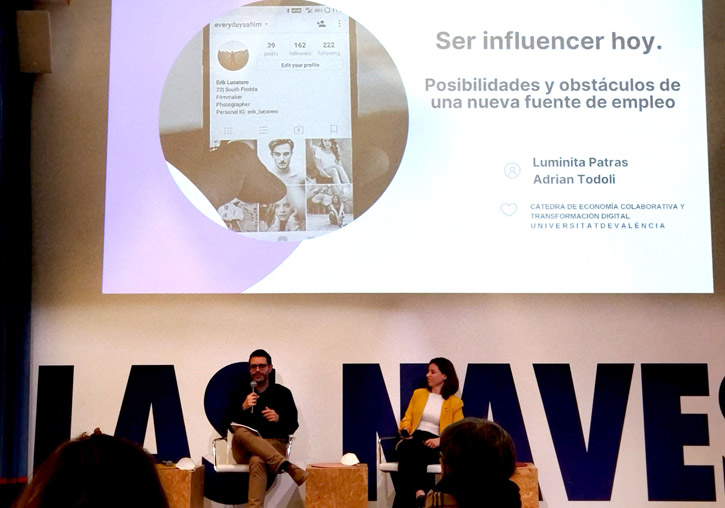The University of Valencia exposes in a conference on influencers the challenges of content creators
- Scientific Culture and Innovation Unit
- April 13rd, 2022

The Collaborative Economy and Digital Transformation Chair of the University of Valencia (UV), in collaboration with the Las Naves innovation centre of the Valencia City Council, has held a conference on the figure of the influencer, a new profile that has been growing exponentially in recent years in a context of massive digitisation. The event has taken place in Las Naves and has had the participation of experts in advertising and marketing, as well as knowing first-hand the experience of those who create content. However, the conference has also served to present the report “Ser influencer hoy: posibilidades y obstáculos de una nueva forma de empleo” (‘Being an influencer today: possibilities and obstacles of a new form of employment’).
Thus, the event has focused on some issues about mental health, working conditions or challenges that influencers face. In this sense, the content creator Miriam Jiménez has highlighted the harassment and hatred that influencers face, especially women, since they are the ones who receive this cyberbullying to a greater extent. “It is clear that women are much more bullied, especially if you get involved in political or controversial issues, because the answer is not a political counterargument, but ‘what table have you gotten yourself under to get there’”, Jiménez lamented.
In turn, the trade union was present thanks to Rubén Ranz, coordinator of digital platforms of UGT. The expert has highlighted two issues that, in his opinion, are fundamental in the mediation between content creators and platforms: that the influencer’s work be recognised as a job and the need for human negotiation between platforms and content creators, beyond the algorithm.
For his part, Adrián Mora, specialist in digital communication and content creator, wanted to claim that there is a professionalisation in the figure of the influencer: “There are people who have studied a career and who have taken advantage of digital tools to talk about it and dedicate ourselves to what we like”, Mora explained.
All these issues are reflected in the report presented by the co-director of the chair and professor of Labor Law and Social Security at the University of Valencia, Adrián Todolí, and the consultant and professor of Organisational Psychology, Luminița Pătraș. This document was born with the aim of analysing the working conditions of content creators, in which 31 interviews are collected. “While I was doing the research, I felt the need for content creators to be heard, in the end it wasn’t me who was thanking, but it was them who were thanking for the opportunity to speak”, underlined the co-author of the document.
For his part, the co-director of the chair has been in charge of presenting the recommendations listed in the report to alleviate these problems based on the results obtained. Thus, two issues have been highlighted. On the one hand, the need to denounce and stop gender discrimination and the harassment suffered by female influencers. On the other hand, Todolí has also highlighted the false appearance of freedom in this new source of employment: “There is a lack of transparency in the operation of the algorithm, there is no regulation of working conditions or protection against harassment”, the co-author has specified.
However, the debate has also focused on the field of advertising and marketing. Along these lines, Isabel López, representative of the advertising agency WeAddYou, has stated that “influencers reach places where brands do not, they understand conversations much better and are much more agile when it comes to creating content”. In addition, the table on advertising has also stressed the need to apply the current regulations of the sector to this new form of employment.
In addition, the event has had the intervention of Marta Chillarón, director of the Las Naves innovation centre. “A tool such as the Collaborative Economy and Digital Transformation Chair that we promote together with the University of Valencia is essential for our centre. We found it very interesting to have this document on grassroots influencers, which allows us to address the new reality of this profession”.
















